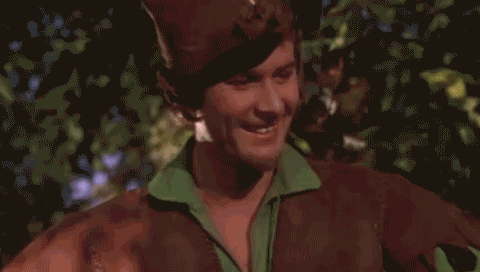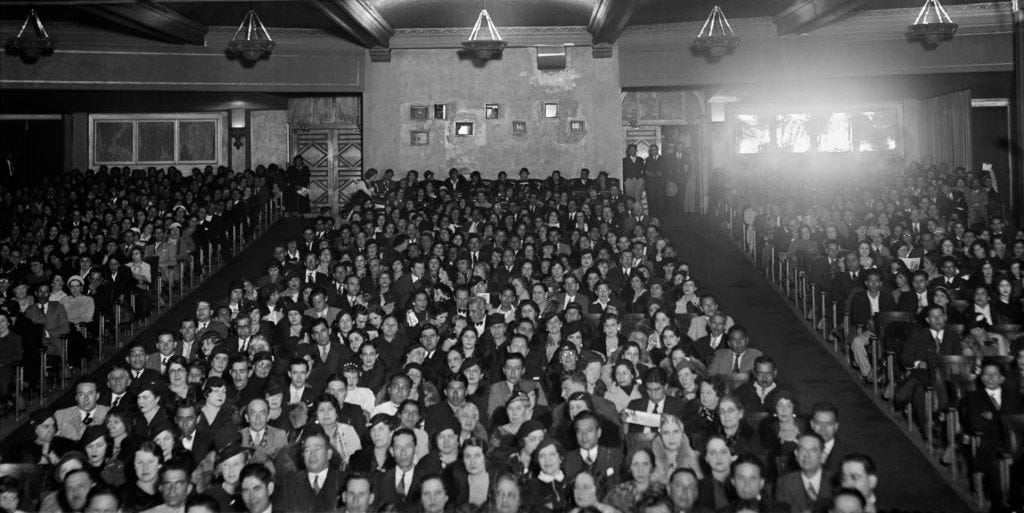GROSS/29-2 1938 - and we're back in the woods
This Robin Hood is a big, silly, adventure movie and a big, generous work of art.
Gross is every year’s top-grossing movie, since 1913, reviewed.
THE ADVENTURES OF ROBIN HOOD, MICHAEL CURTIZ, WARNER BROTHERS, 1938, 102 MINUTES. ERROL FLYNN, OLIVIA DE HAVILLAND
This is an essentially perfect film. I’ve just spent an hour trying to come up with objections but all I’ve got is pedantic nothings: the history’s full of holes, performances are camp, script is cod-Shakespeare. None of that means anything. A list of what’s brilliant and satisfying about The Adventures of Robin Hood would be a long one.
The film became a model for the genre. Cinematography is achingly good - every scene is a work of art, every shot composed like a renaissance painting. The cast has not a single weak element - Errol Flynn, Olivia De Havilland, Basil Rathbone, Claude Rains, Una O'Connor as a splendid (Cockney?) maid. Class all the way down the list. There’s gentle comedy that balances the silliness nicely. You’ll laugh at the cod-Shakespeare but it flows like, well, Shakespeare. Action is perfectly paced. I’m no sword-fight expert but I reckon two or three of the top ten are in this film.
Special mention for the gorgeous Technicolor. It’s a kind of product demo. Bishop’s purples, royal scarlets, Marion’s lilacs and violets and - of course - the universal green of joy and contempt for authority worn by Robin and his happy army of outlaws. Flags flutter vividly against the blue sky, shadows are deep, candles flicker sulfurously. Did it ever get better than this?
Michael Curtiz is one of those directors whose Wikipedia filmography needs its own page. I count more than forty films from before he even gets to America in the mid-twenties and at least a hundred more from the Hollywood period. He was making films into the sixties. I honestly don’t know how to account for an artist whose range takes in this Robin Hood, The Walking Dead (1936, with Boris Karloff), Mildred Pierce (1945, with Joan Crawford), Angels with Dirty Faces (1938, with James Cagney) and Casablanca (1942, with you know who). Journeyman? Artisan? Pro? A movie Michelangelo (I should write more about Curtiz).
And then there’s the music
Since I’m at a loss, really, for something cynical or smart to write here, I’m going to give you a couple of hundred words about the music, which is unarguably gorgeous. Erich Wolfgang Korngold, our composer, is an authentic European genius. One of many brought to Hollywood by war and persecution. But to begin with he didn’t know what he thought about the place. He travelled to and from his home in Austria between projects for several years until, all of a sudden, that wasn’t possible any more and he had to stay.
Of course, the cinema has always, since it became a sound medium, attracted the absolute compositional elite. The creative challenge, the fame, the money. But Korngold was special. In the photographs he looks loveable - a baby-faced genius - even into his fifties. Visibly prodigal (prodigious?). We sense he might be a bit annoying. You know, like all those geniuses. Here he is in a little promo film for A Midsummer Night’s Dream from 1935, apparently working on a lullaby for the movie.
Once he’d settled in Hollywood his clout was quickly immense. From the very first projects his contracts allowed him to show up on set and school actors in how to move to the music that he hadn’t written yet, even to write dialogue to fit his score. He was to be seen in the edit suite suggesting cuts to the negative. No one argued. For the studios Erich Wolfgang Korngold represented competitive advantage.
He worked fast and he was known to work on multiple scores at the same time - and for every film there’d be a lot of music. Nothing parsimonious about Erich Korngold. Watch Robin Hood: does it ever stop? It’s a 102-minute film and it feels like there’s about 108 minutes of music (and when it does stop it’s for a good reason and we’re brought up short by the quiet). He wrote the music for 20 films and it should have been a lot more but he died much too young.
His facility was such that he could happily adapt the work of other composers - the greats, in fact. Mendelssohn for A Midsummer Night’s Dream, his first Hollywood movie, and Wagner for Magic Fire, his last. For the Wagner film he confidently wrote a lot of additional material in the great man’s style. Nobody could tell the difference.
But snobbery
There’s an old argument that Korngold and the other film composers of the period are less interesting than their concert hall contemporaries - Stravinsky, Schoenberg, Mahler, Britten and all the other hotshots - because he’s not a conspicuously modernist artist, not a member of a school or a movement. While his peers were adopting new languages - dissonance, jazz tonalities, impressionism - writing batshit manifestos, causing riots (or becoming an arm of the American military-industrial complex) and so on, he was stuck in an essentially late-19th Century romantic or neoclassical mode.
Korngold’s own compositions were inevitably overshadowed by his film music. He laboured for years over what some consider his most important work, the Symphony in F-Sharp, and insisted it was a work of pure, abstract music, remote from his work in cinema. It was essentially rejected. It’s heartbreaking that this 45-minute work, properly belonging to the heavyweight concert repertoire, was never performed in the USA during Korngold’s lifetime. Critic Alex Ross says, in a fascinating New Yorker piece about the work:
I had seen “The Adventures of Robin Hood” and associated Korngold with Errol Flynn running up and down staircases. The symphony, though, seemed far removed from movie fantasy. It was a rigorous, disciplined four-movement narrative, squarely in the Beethoven-to-Bruckner line, proceeding from coiled struggle to spacious triumph. The third movement, the Adagio, rose to an agony of sorrow that felt private rather than performative; dissonances shuddered and splintered in the air.
The snobs say there’s something inherently conservative or even backward about film music, that the swelling strings and thumping bass of a movie soundtrack are mechanical, descriptive, necessarily trivial or schmaltzy - incompatible with the ideals of art music. They suspect that the movie composers have carried forward all the sentimental and unsophisticated elements of programme music, mainstay of 19th Century classical composition - tunes about things: caves, countries, animals. Real music has no programme, only form.
This snobbery persists, of course - 21st Century classical audiences are routinely scornful when cinema music lands in their exalted venues and outlets.
This is all, of course, bullshit. A bourgeois solecism. And a perspective that fails to take into account cinema’s profoundly avant-garde mode of production. What could possibly be more art-music than producing music to accompany this brand new 20th Century media technology? More modernist than filling big rooms in cities and towns all over the world every night with working people seeking joy and laughter and release?
How could a creative discipline that requires working inside the production machinery of a hypermodern popular form like film not be a modernist one? Film music - meshing synchronised music with complex, discontinuous movie narratives - is pure modernism, like nuclear reactors or Mrs Dalloway. And the economics of the movie production pipeline - capital, technology and art in a weird new conjunction - is sophisticated, post-industrial modernism.
Here I use the word ‘gesamtkunstwerk’.
The joyful gesamtkunstwerk of Erich Korngold and a small handful of his 1930s contemporaries became a model for the making of movies until the present day. Their deep engagement with the narrative - only ten years after the first sound movie and the first primitive musical soundtracks - became the norm. Their readiness to get involved at every level of the production, from script to edit, predicts the vast, central-planning model of movie production that dominates now. The richly integrated, highly finished works of art, with budgets approaching the GDP of a small country, that now fill the release schedules all have music and sound that’s been crafted and detailed to within an inch of its life.
Composers like Hans Zimmer and Ludwig Goransson (Oppenheimer) and sound designers like Johnnie Burn (Zone of Interest) work against a backdrop of rapidly-advancing technology and with a close connection to the production - on location, in the edit suite, in post-production. They inherit Korngold’s sense that the movie’s sound-world is not a secondary element of the film, that it engages parts of the audience’s brain and emotions not reached by the visuals.
I’d like to see an Una O’Connor biopic. Just saying.
I’m sorry I said Korngold was annoying. I have no evidence at all for this. In fact it says here that he was “…a man of the greatest integrity and honesty, he was serious when the occasion demanded, but the seriousness was always tempered with great warmth and humor.” Although that’s his devoted daughter-in-law talking, so the jury’s still out.
Neil Brand made a terrific short episode of BBC Radio 3’s Sound of Cinema about the film (it’s a download).
There are now dozens of recordings of Korngold’s Symphony in F-Sharp and his non-film works are regularly performed. Even his essentially forgotten opera Die Tote Stadt, written when he was in his twenties, living in Berlin, is now regularly staged.
For the 2024 Oscars BBC Radio 3 ran an excellent two-hour movie music special.
The Adventures of Robin Hood is on Amazon Prime and there’s a Blu-Ray.
Here's a list of all the top-grossing films since 1913 and here's my Letterboxd list and here’s another top-grossing list.






